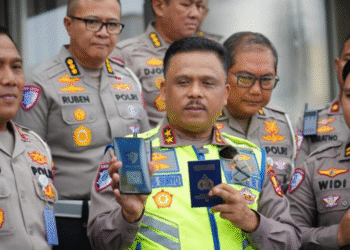The same position was previously held by Vice President Ma’ruf Amin during President Joko Widodo’s administration. Tito explained that the BKP3 is tasked with coordinating, harmonizing, and evaluating policies related to development efforts in Papua. Although an office for the agency already exists in Jayapura, it will be used by the agency’s secretariat and implementation team—not by the vice president himself.
“It’s not a new office for the vice president. It has long been prepared for the agency’s executive team,” Tito clarified during a press briefing at the Parliament Complex on Tuesday.
The agency’s responsibilities are broad, especially following the division of Papua into six provinces. Gibran’s immediate tasks will include overseeing the construction of new government buildings, ensuring cross-ministerial and regional program integration, and aligning projects with national priorities. For instance, infrastructure development such as dams and ports requires collaboration among the Public Works Ministry, the Ministry of Transportation, and provincial governments.
Coordinating Minister for Law, Human Rights, Immigration, and Corrections, Yusril Ihza Mahendra, also outlined the organizational structure of the agency. BKP3 will include several key ministers such as the Minister of Home Affairs, the Minister of National Development Planning (Bappenas), the Minister of Finance, and representatives from each province in Papua. The structure and personnel of the agency’s secretariat will be further detailed in a forthcoming Government Regulation.
Yusril emphasized that while the agency is headquartered in Papua, the vice president’s official duties remain in the capital. “The vice president has constitutional duties as stipulated in the 1945 Constitution. Therefore, his office must remain in the national capital alongside the president,” he said. He added that reports suggesting the vice president would relocate his office to Papua are misleading.
Article 68A of Law No. 2 of 2021 concerning Papua’s Special Autonomy stipulates the establishment of the BKP3 to synchronize, coordinate, and evaluate Otsus implementation. The agency’s Jayapura-based office will function as an administrative and communication hub, bridging local and central governments.
Meanwhile, local experts urge Gibran to approach his role with careful assessment. Frits Ramandey, head of the Secretariat of the National Human Rights Commission (Komnas HAM) Papua, stated that Gibran should begin by evaluating the performance of the previous agency, BP3OKP, to measure its progress and identify gaps.
He also recommended assembling a team of domain experts—from healthcare and education to social and religious affairs—rather than appointing individuals based on political interests. “This team must be composed of professionals with proven experience. It should not become a mere political symbol,” Frits warned.
However, Frits stressed that addressing Papua’s ongoing armed conflicts should be the top priority. Without resolving the root causes of violence, he said, even the most ambitious development programs will face significant hurdles. “The acceleration of development will be hindered if conflict persists. Economic, education, and health services are all affected,” he noted.
Komnas HAM’s recent reports show an increase in armed conflict over the past five years, often putting civilians and development workers at risk. Frits urged the government to prioritize peace-building and conflict resolution through dialogue.
“The vice president must begin by understanding the obstacles. His team should already be exploring concrete solutions,” Frits concluded. “Managing violence and building peace must come first to ensure meaningful development.”














